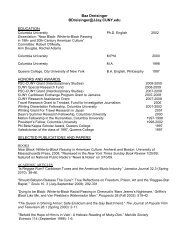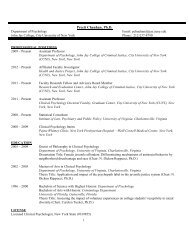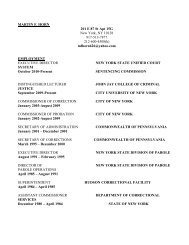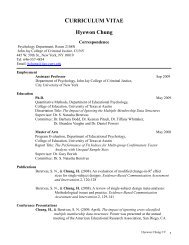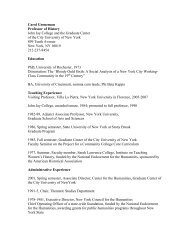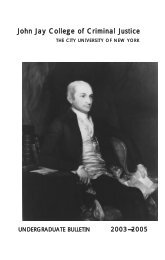Bulletin - John Jay College Of Criminal Justice - CUNY
Bulletin - John Jay College Of Criminal Justice - CUNY
Bulletin - John Jay College Of Criminal Justice - CUNY
Create successful ePaper yourself
Turn your PDF publications into a flip-book with our unique Google optimized e-Paper software.
Courses <strong>Of</strong>fered<br />
the 15th century to the present. The course will use an ethnomusicological<br />
approach to sound and video recordings and examine<br />
how African-American musics reflect important historical and social<br />
forces in the Americas and how these musics connect to Africa and<br />
conceptions of Africa in the Americas.<br />
Prerequisites: ENG 102 or ENG 201; and any General Education<br />
History course (HIS 231 or HIS 232 or HIS 203 or HIS 204 or HIS<br />
205); and any 100-level music course, or permission of the instructor<br />
PHI 105 Critical Thinking and Informal Logic<br />
3 hours, 3 credits<br />
This course is a basic introduction to critical reasoning. Focus is on<br />
students’ developing and applying skills in critical and analytic<br />
reading and writing. Topics covered include recognizing arguments,<br />
identifying premises and conclusions, clarity and relevance in<br />
argumentative language, distinguishing types of arguments, validity<br />
and soundness in constructing and evaluating arguments, fallacies,<br />
elements of legal reasoning.<br />
NATURAL SCIENCE (Department of<br />
Sciences)<br />
NSC 107 Introduction to Science in Society<br />
6 hours: 3 hours lecture, 1 1/2 hours recitation, 1 1/2hours laboratory; 4 credits<br />
A course in the basic principles of atomic and molecular physical<br />
science including concepts of measurement and data collection, the<br />
scientific method, the structure of matter and living organisms, with<br />
emphasis on the relationships between science and society.<br />
Prerequisites: MAT 104, and MAT 105 or the equivalent. May not<br />
be taken after CHE 108, ENV 108, FOS 108 or PHY 108.<br />
PHILOSOPHY<br />
PHI 102 Introduction to Ethics<br />
3 hours, 3 credits<br />
Do objective moral standards exist or is morality relative to culture or<br />
individual This course examines the principles that guide moral<br />
reasoning and argumentation. The main theories of ethical<br />
justification are analyzed, with application to such selected issues of<br />
social morality as punishment, civil disobedience, privacy and sexual<br />
behavior, war, racial and sexual equality, abortion, euthanasia,<br />
business integrity and economic justice.<br />
PHI 201 Philosophy of Art<br />
3 hours, 3 credits<br />
Theories of beauty, creativity and expression, emotion and art; art<br />
and society; aesthetics and ethics. Readings include Aristotle,<br />
Plotinus, Lessing, Kant, Hegel, and Nietzsche.<br />
Prerequisites: ENG 101; sophomore standing or above or permission<br />
of the section instructor<br />
PHI 202 American Philosophy<br />
3 hours, 3 credits<br />
This course is a look at the history of philosophy as it has been<br />
practiced in the United States. The course will pay close attention to<br />
the uniquely American philosophical movement known as<br />
pragmatism, but the course may also study some intellectual<br />
precursors to pragmatism such as transcendentalism, and intellectual<br />
figures such as Thoreau, and Emerson. Moreover, the course may<br />
involve the study of philosophical works and figures that are often<br />
left out of the history of American philosophy, such as David Walker,<br />
Martin R. Delaney, Ida B. Wells, Frederick Douglas, and W.E.B.<br />
DuBois. The course may also include some contemporary texts or<br />
issues in American philosophy.<br />
Prerequisite: ENG 101<br />
125



